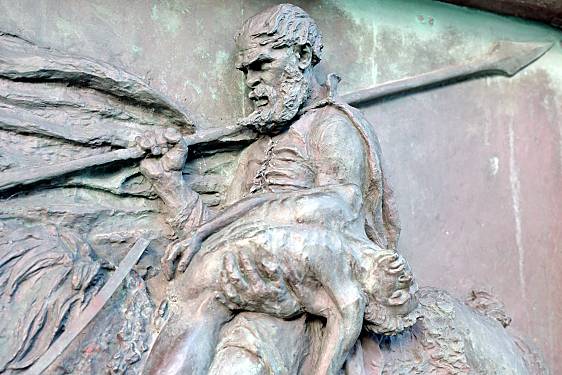
|

|
Egill Skallagrķmsson
born: 910 at Borg in Mżrar in Iceland
died: 990 at Mosfell in Mossfellssveit in Iceland
married: 939 Įsgeršur Bjarnardóttir
Egill was a powerful farmer, chieftain, Viking, brawler, and poet. He was never at a loss for words, and he was skilled with weapons as well. Like his father, he was black-haired and ugly. There are so many memorable episodes about Egill in Egils saga that it is hard to select just one.
These events happened when Egill was an older man. Böšvar was Egill's youngest and most promising son. The young man traveled to the trading center at Hvķtįrnes, on the other side of the fjord from the family farm at Borg. On the journey back home, the weather turned foul. The boat overturned, and Böšvar and the other men onboard drowned.
 |
Egil heard the news that day and rode off immediately to search for the bodies. He found Bodvar's body, picked it up and put it across his knees, then rode with it out to Digranes to Skallagrim's burial mound. He opened the mound and laid Bodvar inside by Skallagrim's side. The mound was closed again, which took until sunset. After that, Egil rode back to Borg, and when he got home, he went straight to his normal sleeping-place, lay down and locked the door. No one dared to ask to speak to him. Egils saga, ch. 78 |
Egill took neither food nor drink, bereft at the loss of his favorite son. After three days of this, his wife sent for Žorgeršur, Egill's beloved daughter, and she rode immediately from her farm. Žorgeršur stood outside the bed-closet where Egill lay and said in a loud voice that she, too, did not want to live. Egill opened the door, and Žorgeršur joined her father. Once inside, she tricked him into taking nourishment. Saying that their plan to die in the bed-closet together had been ruined, she asked her father to compose a poem in memory of Böšvar.
Egill created Sonatorrek, a moving, heartfelt expression of Egill's emotions on the loss of Böšvar (and of another son who died a little earlier). Sadly, the poem has not been perfectly preserved in the manuscripts, but the defects do not dilute the raw power of the verse, power that still provides a visceral impact today. Additionally, the poem provides one of the clearest views of the relationship between Viking-age people and their ancient gods.
|
|
©2013-2026 William R. Short |